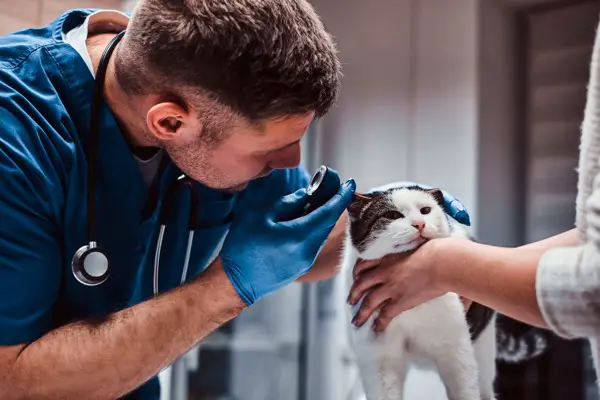Our animal companions also have health issues and they depend on us to notice their problems and take necessary actions. It’s important to recognize signs of common illnesses and respond by prompt medical attention.
There are many emerging trends in treating various health issues faced by pets. For example, CBD has gained popularity recently and it has proven to be effective in managing many health issues. Find out more about why CBD treats are worth your money.
To identify the common health issues, it’s important to take your pet to a vet for regular checkups. For serious issues, you must take your pet to a vet immediately.

Here’s a list of some common issues our pets face.
-
Skin infections
Skin infections are more common in dogs. In skin infections, dogs have a fever, and itch and scratch their skin often. Such infections are often caused by bacteria, fungi, and parasite bites. These skin conditions can get worse, and even lead to cancer.
A vet may prescribe some medicine to help with the inflammation or recommend a shampoo to get rid of the parasites to keep the skin healthy. For deep infections, antibiotics are administered by injection or orally.
Does your dog have a problem with ticks? Find out how to deal with tick bite fever in dogs and prevent them to keep your dog healthy.
-
Rabies
Rabies is a common disease in animals. Rabies is a viral disease that’s spread from one animal to another through bites or scratches. This infection is potentially fatal, and it can affect cats, dogs, humans, and other mammals.
It’s important to seek medical attention as soon as you’re bitten. If symptoms appear, it may be too late for a successful treatment.
Prevent your pets from wandering far away as that’ll put them at a higher risk of getting bitten. Also, you must vaccinate your pets so that they don’t get rabies from wild animals.
-
Periodontal disease
It’s a gum and teeth disease. It’s caused by dental plaque accumulation, which affects the gums and the teeth.
Signs include difficulty in chewing, one-sided chewing, and bad breath. It can cause serious conditions if untreated.
Manage the disease by regular checks for issues, brushing the teeth, and feeding your pet with foods approved for treating tartar.
-
Vomiting
Vomiting doesn’t have a single cause. It can be caused by eating too much, eating toxic foods, and food poisoning.
Mostly, vomiting isn’t serious. However, if the vomiting persists, you must call a vet.
-
Urinary tract infections
These are bladder infections caused by inflammation, cancer, and stone accumulation in the bladder. Signs include drinking excess water, urinating frequently, and bloody urine.
Treatments include treating underlying reasons which cause infections like diabetes, changes in diet, and the use of antibiotics. Also, there are treatments to get rid of the stones.
-
Ear infections
Ear infections are most common in dogs. Infections cause them to scratch and shake their heads often. An infected animal may produce a dark discharge that has a bad odor.
Infections are caused by injuries, wax buildup, and foreign bodies. Vets can treat them using antibiotics and anti-parasite medications. However, you need to perform regular checkups to prevent re-infection.
-
Eye infections
Infections may cause discharge in the lining of the pet’s eyes. Conjunctivitis is a condition when watery yellow-green pus is discharged on the lining of the pet’s eyes. Signs are red eyes, frequent blinking, and closing the eyes often.
Conjunctivitis is caused by allergies and bacterial infections. Treat this by using anti-inflammatory drops and injections.
-
Diarrhea
Diarrhea is caused by intestinal upsets. Acute diarrhea is less of a concern, but chronic diarrhea calls for medical attention. Signs include watery stools, vomiting, and weight loss.
In the early stages, you can treat diarrhea by giving your pet a balanced diet and giving it probiotics. Over-the-counter medications can also help in some cases.
-
Poisoning
Animals are prone to poisoning because they’re driven by food. Though not recommended, you should make your pet vomit in poisoning cases. It can help. If poisoning involves the skin, wash the skin to prevent further spreading.
It’s better to consult your vet for more help in poisoning cases.
-
Parasites

Most animals are affected by parasites and it’s up to us to help them. If untreated, parasites can cause a lot of damage like weight loss, intestinal problems, and blindness.
Prevention is better and easy. Keep parasites away by frequent cleaning of pets, regular deworming, and spraying the fur and the skin with medication.
It’s our responsibility to take care of our pets. Find more solutions on best pet products and call your vet first when you notice a health issue.





